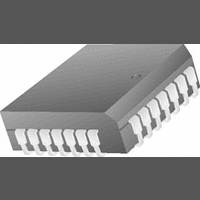LM12H458CIV National Semiconductor, LM12H458CIV Datasheet - Page 9

LM12H458CIV
Manufacturer Part Number
LM12H458CIV
Description
A/D Converter (A-D) IC
Manufacturer
National Semiconductor
Datasheet
1.LM12H458CIV.pdf
(36 pages)
Specifications of LM12H458CIV
No. Of Pins
28
Peak Reflow Compatible (260 C)
No
Supply Voltage
5V
Supply Voltage Max
5V
No. Of Bits
12 Bit
Leaded Process Compatible
No
Mounting Type
Surface Mount
No. Of Channels
1
Number Of Elements
1
Sample Rate
182KSPS
Input Polarity
Bipolar
Input Type
Voltage
Rated Input Volt
±5V
Differential Input
Yes
Power Supply Requirement
Analog and Digital
Single Supply Voltage (typ)
5V
Single Supply Voltage (min)
3V
Single Supply Voltage (max)
5.5V
Dual Supply Voltage (typ)
Not RequiredV
Dual Supply Voltage (min)
Not RequiredV
Dual Supply Voltage (max)
Not RequiredV
Differential Linearity Error
±0.75LSB
Integral Nonlinearity Error
±1LSB
Operating Temp Range
-40C to 85C
Operating Temperature Classification
Industrial
Mounting
Surface Mount
Pin Count
44
Package Type
PLCC
Lead Free Status / RoHS Status
Contains lead / RoHS non-compliant
Lead Free Status / RoHS Status
Contains lead / RoHS non-compliant
Available stocks
Company
Part Number
Manufacturer
Quantity
Price
Company:
Part Number:
LM12H458CIV
Manufacturer:
Texas Instruments
Quantity:
10 000
Part Number:
LM12H458CIV
Manufacturer:
NS/国半
Quantity:
20 000
Company:
Part Number:
LM12H458CIV/NOPB
Manufacturer:
National Semiconductor
Quantity:
135
Company:
Part Number:
LM12H458CIV/NOPB
Manufacturer:
Intersil
Quantity:
188
Company:
Part Number:
LM12H458CIV/NOPB
Manufacturer:
Texas Instruments
Quantity:
10 000
Company:
Part Number:
LM12H458CIVF
Manufacturer:
Texas Instruments
Quantity:
10 000
Digital Timing Characteristics
Note 1: Absolute Maximum Ratings indicate limits beyond which damage to the device may occur. Operating Ratings indicate conditions for which the device is
functional, but do not guarantee specific performance limits. For guaranteed specifications and test conditions, see the Electrical Characteristics. The guaranteed
specifications apply only for the test conditions listed. Some performance characteristics may degrade when the device is not operated under the listed test
conditions.
Note 2: All voltages are measured with respect to GND, unless otherwise specified.
Note 3: When the input voltage (V
The 20 mA maximum package input current rating allows the voltage at any four pins, with an input current of 5 mA, to simultaneously exceed the power supply
voltages.
Note 4: The maximum power dissipation must be derated at elevated temperatures and is dictated by T
to ambient thermal resistance), and T
Note 5: Human body model, 100 pF discharged through a 1.5 kΩ resistor.
Note 6: Two on-chip diodes are tied to each analog input through a series resistor, as shown below. Input voltage magnitude up to 5V above V
will not damage the LM12454 or the LM12(H)458. However, errors in the A/D conversion can occur if these diodes are forward biased by more than 100 mV. As an
example, if V
Note 7: V
conversion/comparison accuracy.
Note 8: Accuracy is guaranteed when operating at f
Note 9: With the test condition for V
Note 10: Typical figures are at T
Note 11: Limits are guaranteed to National’s AOQL (Average Output Quality Level).
Note 12: Positive integral linearity error is defined as the deviation of the analog value, expressed in LSBs, from the straight line that passes through positive
full-scale and zero. For negative integral linearity error the straight line passes through negative full-scale and zero. (See Figure 6 Figure 7).
Note 13: Zero error is a measure of the deviation from the mid-scale voltage (a code of zero), expressed in LSB. It is the worst-case value of the code transitions
between −1 to 0 and 0 to +1 (see Figure 8).
Note 14: The DC common-mode error is measured with both inputs shorted together and driven from 0V to 5V. The measured value is referred to the resulting
output value when the inputs are driven with a 2.5V signal.
Note 15: Power Supply Sensitivity is measured after Auto-Zero and/or Auto-Calibration cycle has been completed with V
Note 16: V
Note 17: The LM12(H)454/8’s self-calibration technique ensures linearity and offset errors as specified, but noise inherent in the self-calibration process will result
in a repeatability uncertainty of
Note 18: The Throughput Rate is for a single instruction repeated continuously. Sequencer states 0 (1 clock cycle), 1 (1 clock cycle), 7 (9 clock cycles) and 5 (44
clock cycles) are used (see Figure 15). One additional clock cycle is used to read the conversion result stored in the FIFO, for a total of 56 clock cycles per
conversion. The Throughput Rate is f
A
+ and V
REFCM
A
+ is 4.5 V
(Reference Voltage Common Mode Range) is defined as (V
D
+ must be connected together to the same power supply voltage and bypassed with separate capacitors at each V
DC
, full-scale input voltage must be ≤4.6 V
±
A
0.10 LSB.
IN
= 25˚C and represent most likely parametric norm.
) at any pin exceeds the power supply rails (V
REF
CLK
A
(ambient temperature).
(V
(MHz)/N, where N is the number of clock cycles/conversion.
REF+
− V
CLK
REF−
= 5 MHz for the LM12454/8 and f
) given as +5V, the 12-bit LSB is 1.22 mV and the 8-bit/“Watchdog” LSB is 19.53 mV.
(Notes 6, 7, 8) (Continued)
DC
to ensure accurate conversions.
REF+
9
IN
<
+ V
GND or V
REF−
CLK
)/2.
IN
= 8 MHz for the LM12H458.
>
01126403
(V
Jmax
A
+ or V
(maximum junction temperature), θ
D
+)), the current at that pin should be limited to 5 mA.
A
+ and V
D
+ at the specified extremes.
A
JA
+ or 5V below GND
(package junction
+
www.national.com
pin to assure











